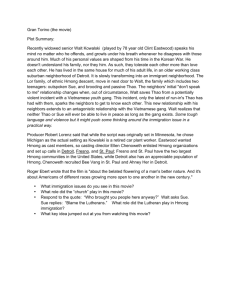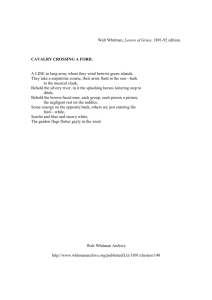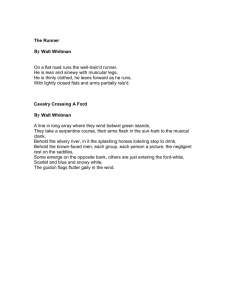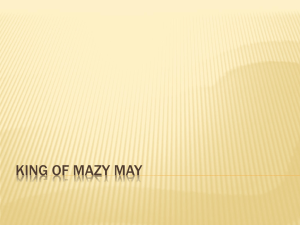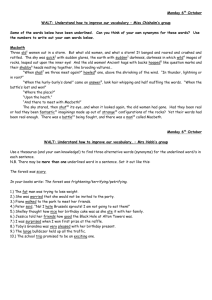Gran Torino Essay - Kyle Thomas Farrell
advertisement
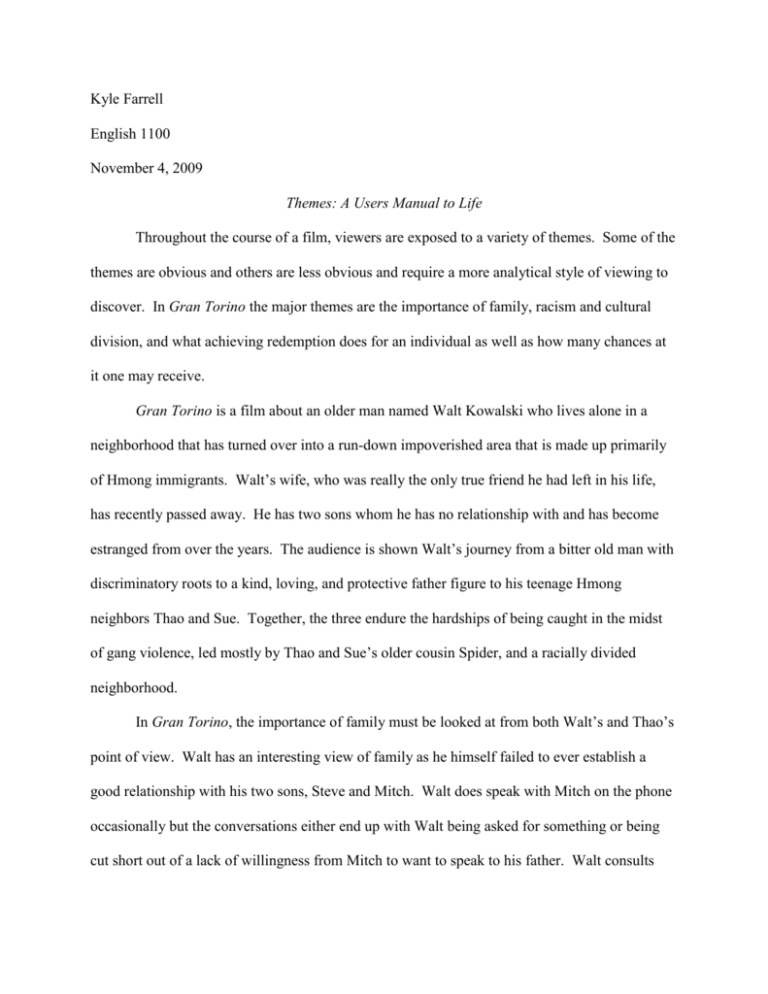
Kyle Farrell English 1100 November 4, 2009 Themes: A Users Manual to Life Throughout the course of a film, viewers are exposed to a variety of themes. Some of the themes are obvious and others are less obvious and require a more analytical style of viewing to discover. In Gran Torino the major themes are the importance of family, racism and cultural division, and what achieving redemption does for an individual as well as how many chances at it one may receive. Gran Torino is a film about an older man named Walt Kowalski who lives alone in a neighborhood that has turned over into a run-down impoverished area that is made up primarily of Hmong immigrants. Walt’s wife, who was really the only true friend he had left in his life, has recently passed away. He has two sons whom he has no relationship with and has become estranged from over the years. The audience is shown Walt’s journey from a bitter old man with discriminatory roots to a kind, loving, and protective father figure to his teenage Hmong neighbors Thao and Sue. Together, the three endure the hardships of being caught in the midst of gang violence, led mostly by Thao and Sue’s older cousin Spider, and a racially divided neighborhood. In Gran Torino, the importance of family must be looked at from both Walt’s and Thao’s point of view. Walt has an interesting view of family as he himself failed to ever establish a good relationship with his two sons, Steve and Mitch. Walt does speak with Mitch on the phone occasionally but the conversations either end up with Walt being asked for something or being cut short out of a lack of willingness from Mitch to want to speak to his father. Walt consults with a doctor and discovers he is very ill, and wants to tell his son Mitch but does not end up doing so. This shows a softer side of Walt and infers that he does in fact hold family as important. Walt outwardly appears to be fine with having no friends or family, as he refers to his sons as his “spoiled rotten family”, but as the film progresses it becomes more evident that he does long for friendship and family. While family doesn’t seem like a high priority of the Kowalski’s, the Hmong family could not be any different. The Hmong put a very high value on family and it is shown very early in the film when the Hmong are welcoming a newborn child into the world with a Shaman giving blessings to the child for a long healthy life. However, despite the closeness of the family, Thao, who is a middle aged teen, is in need of guidance in his life as he has no father to guide him into becoming a young man. The people surrounding Thao recognize this need for him, and in the film, Thao actually does find that father figure in Walt. In each other, Walt and Thoa find what they have never had. Walt is able to fill the void left by his sons and Thao is able to fill the void that was left by his father never being around. Walt teaches Thao how to become a young man by teaching him how to talk like a man in the barbershop and by assisting him in getting his first job at the construction site. Walt looks out for Thao as if he was his own son, and they share many father son moments together that Walt never got to experience with his sons. This is seen in such scenes as where Walt gives Thao his first set of tools in the form of a can of WD-40, vise grips, and duct tape. They also work together when Walt asks for Thao’s help to move his freezer from the basement. The message behind these scenes from Gran Torino is that all people inevitably will long for and need the friendship and love that only family can give. It relates to many families in a society like today because often families are broken apart over petty things that should be overcome with relative ease, and throws out the idea that if someone in as bad of a situation as Walt and Thao can do it then many others are capable of overcoming their respective issues too. The second theme that is found while viewing Gran Torino is racism among the cultures. The Detriot neighborhood which the Hmong family and Walt live in is made up mostly of Hmong immigrants, but there are also African Americans, Caucasians, and Hispanics. Tension between the Hmong and Hispanics is shown where Spider and his gang pull up alongside the Hispanic gangsters who are harassing Thao and flash their weapons at them and yell slurs at them, telling the Hispanics to “Go back to your own country” and other derogatory terms. In Gran Torino the African American thugs that are shown take issue with anyone of another ethnic background that happens to come through their area of the neighborhood. One scene in particular shows them harassing Sue and her white friend to which Sue replies “Oh great, another ass hole with an Asian girl fetish, God this is getting old” and in that same scene Walt pulls up in his truck to give Sue a ride back to her house and refers to the African American thugs as “Spooks”. If looked at on the surface, one would certainly state that Walt is a man with strong racist roots. They would say Walt is the most racist individual in the entire film. However, the saying that actions speak louder than words applies to Walt in that though he often makes discriminatory comments towards those of different ethnic backgrounds, all throughout the movie he is helping a Hmong family, which is a culture of Asian descent. Walt’s view come from his time at war and his upbringing, however, Walt is not truly a racist at heart. Yes, he refers to the Hmong as “Swamp rats” and “Zipper heads”, but his actions speak louder than his words. However, like others may at times, Walt has his occasional racial outbursts that can certainly be looked at as a more true form of racism. Walt displays his dislike for groups of people through racial comments, and the viewer is aware when he is serious and using the terms playfully. The most powerful scene involving Walt and racism is the scene outside of his home, where a fight between the Hmong family and Spider’s gang spills over onto his front yard. This scene is seen mostly from one of the gangsters named Smokie’s point of view. The viewer has a view directly up the barrel of Walt’s M1Garand rifle as if they were knelt down. The ensuing dialogue is Walt’s most racially charged comments of the entire film. As he points his rifle at the gangsters, he says “Get off my lawn” to which Smokie rebukes, saying “Listen old man, you don’t wanna fuck with me, you fucking crazy, go back in the house,” and to that Walt replies “Yeah, I blow a hole in your face, and then I go back in the house and I sleep like a baby, you can count on that. We used to stack fucks like you five feet high in Korea, use ya for sandbags”. Another form of racism and a display of a cultural divide are shown through a non malicious manner. Such scenes as where Walt is at the barbershop and refers to his barber as a “Dago” and then is himself referred to as a “Pollack”. It is also shown after Walt and Thao become friends. Walt still refers to Thao as “Zipper head” and teases Thao and Sue about eating dogs, but it is all in a friendly causal way, as the dynamic of their friendship allows for this to be acceptable for such things to be said with the knowledge that there are no malicious intentions behind them. The last scene that strongly shows a cultural divide is the doctor’s office scene when Walt is in the waiting room, and an immigrant assistant refers to Walt as “Mr. Koski” several times, incorrectly pronouncing “Kowalski” to which Walt becomes clearly agitated by. Gran Torino as a whole is racially charged throughout the film, and even during times when it may be friendly, it is still racism. The divide is strong among cultures as they do not mingle with one another. The director of this film chooses to use racism as a major theme in this film because racism is still a big issue in America, especially in inner city areas. The director shows the effect that war has on an individual in shaping their views of various races, depending on which era they come from. It parallels to modern day America as many Middle Eastern people and Muslims experience racism for similar reasons, war being the common denominator, as the Korean War is alluded to several times which parallels today’s wars in Iraq and Afghanistan. This theme raises a sense of awareness to the audience that racism is a problem due to various circumstances, but to remember that no matter what race a person is, that they still are deserving of a chance, just as Walt gave a chance to Thao. The final major theme of Gran Torino is the idea of how many chances one gets at redemption and what redemption gives to a person. In Walt’s case, the number of chances applies to him because he has lived a full life, and has made plenty of mistakes over the course of sixty years. He recognizes the mistakes he has made in his past, and throughout Gran Torino Walt’s actions all work towards trying to make the wrongs of his past the rights of today and his future. Walt looks to redeem himself by taking care of Thao as he would with his own sons if could do it over again. He gives Thao tools and takes him to the store to purchase tools too. Walt’s final two acts towards redemption are shown through two scenes. The first is the church scene where he receives the sacrament of Reconciliation. His penance is to say ten “Hail Mary” prayers and five “Our Father” prayers, which after doing becomes fully absolved from his sins. The second scene which is his final act is a culmination of all his actions up to this point. Walt sacrifices his life for Thao and Sue so that they may be able to live the rest of their lives with peace of mind and soul. Walt confronts Spider’s gang at their home, and they engage in a heated discussion which results in Walt being gunned down, however, right before the bullets fly, Walt completes the final verse to the tenth “Hail Mary” of his penance. Walt has finally come to peace with his life, and in knowing that he is making the lives of Thao and Sue better gives him peace of mind, and having gone to church to reconcile, he dies with peace of soul. Redemption applies to Thao in that he is in a position to be deserving of a chance at redemption. He is a lost soul and a misfit for most of his life to this point. Under intense peer pressure, he decides to try being a member of Spider’s gang, but fails during initiation, which was to steal Walt’s 1972 Gran Torino. After the failed attempt he realizes the gangster lifestyle is not for him. Thao deserves a chance because he was pressured into doing something, opposed to those like Spider who willingly choose a life of crime and violence. In his road to redemption, Thao does handy work for Walt around the house and yard for a week, and during that time he shows a strong work ethic and dedication to the work he is assigned to do. After finishing his work, he gains a respectable standing within his family, and is able to get a girlfriend for the first time. Eventually following Walt’s passing, he is given the 1972 Gran Torino. He has redeemed himself and become a respectable young man with a car, a girl, and a job. This theme is important because it applies to many as a life lesson. It shows that a chance to make up for past mistakes seldom come by. This theme also delivers the message that good things can happen when making the most of opportunities presented, as both Walt and Thao did, and also reminds the viewers that if mistakes become a trend and are willingly done routinely, that the window for redemption quickly closes. Spider and his gang’s window closed quickly, as they all are now in jail. Gran Torino has many themes from which to choose from, however, these are the most important and major themes of this film. These themes show their importance because each sends a life lesson oriented message across to the viewers. These major themes are common among the lives of many Americans today and parallel the happenings in today’s society. Despite the film’s seemingly obvious plot, when looked at closer, much more meaning is found through these major themes of family, a culturally divided America, and finally, attaining redemption and what redemption gives to a deserving individual. There is much that can be taken from this film, and the lessons learned by the characters in the film can be translated into the lives of many Americans today.
